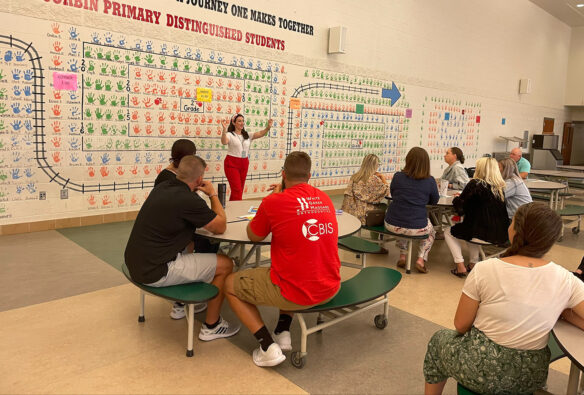
Ashley Hill, assistant director of early literacy for the Kentucky Department of Education, participated in LETRS training when she was employed in the Corbin Independent school district.
Photo courtesy of Ashley Hill
Ashley Hill recently joined the Kentucky Department of Education (KDE) in the Office of Teaching and Learning as the assistant director of early literacy. In this role, Hill is overseeing the implementation of the statewide literacy coaching model. She is extremely optimistic that through a sustainable coaching system, the investment will be in teachers and administrators, who, in turn, will be equipped with the knowledge and skills necessary to effectively teach our youngest students to be proficient readers based on the research behind how the brain learns to read.
“The preeminent way to reach our students and improve their lives is through giving them the knowledge and foundational skills they need to be adept readers. An investment in the teachers and administrators who work directly with these students each day will increase reading proficiency for all students,” said Hill. “We are excited to pour into our educators through intentional professional learning and support so that in the end, our students will be the greatest benefactors of this work.”
What professional learning is out there to help teachers and administrators understand the research behind how the brain learns to read and why some students struggle? KDE is providing access to Language Essentials for Teachers of Reading and Spelling (LETRS), as part of the Kentucky Reading Academies. LETRS is a two-year, in-depth, job-embedded professional learning series; it is not a program. The training prepares teachers to learn and use any well-designed reading program to better meet the diverse reading needs of early readers. LETRS complements and supports the implementation of high-quality reading programs aligned to the research behind how people learn to read.
Hill was fortunate to begin LETRS training in the 2022-2023 academic year while still employed at Corbin Independent. She completed the administrator professional learning and year one of the educator training. Through the administrator training, Hill received access to tools she used to support the school literacy team at her former district as they began shifting to a structured literacy approach.
One critical tool was the Administrators Literacy Framework, developed by LETRS. This instrument provides a roadmap to self-assessment of the as-is state of the school literacy program and guidance around leadership, assessment, universal core instruction, data-based decision-making, intervention, professional learning and community and family involvement. Being involved in the administrative and educator training equipped Hill with ways to support teachers effectively.
“Any kind of change is difficult. I wanted the end goal to be a complete shift in literacy practices, but I needed the language and tools to make this a reality. LETRS has given me the support I need to be a literacy leader,” said Hill. “No one person ever has all the answers. Still, the Administrators Literacy Framework, provided by the LETRS administrator training, gave me the guidance I needed to affirm current practices and find growth areas for our school literacy program.”
Upon learning about the structured literacy approach, Hill convened a group of stakeholders to examine multiple curricular vendors. Once she and the team were exposed to a knowledge-based curriculum incorporating the five essential components of reading, they knew this was what they needed. Additionally, a scheduling committee was created, and together they found ways to ensure that no child was ever pulled from their Tier 1 reading instruction.
After using the Tier 1 knowledge-based curriculum for reading instruction and analyzing universal screener data, Hill and the team adopted an evidence-based intervention program endorsed by the International Dyslexia Association, which included a multi-sensory approach to teaching students to decode words. Students can now access text by decoding words and making sense of what they read because of the knowledge-building high-quality instructional resources (HQIRs).
The linchpin of success, besides the use of HQIRs, is the teachers’ participation in LETRS training. A cohort of 18 teachers from Corbin Primary School are finalizing year one and are looking forward to the learning in year two. A new cohort of 18 teachers will begin LETRS coursework in the 2023-2024 academic year. The more educators we can give access to the information from LETRS, the more students will experience the structured literacy approach.
“The ultimate goal is to produce proficient readers by the end of third grade,” said Hill. “Being a skilled reader opens many opportunities that students may only be able to take advantage of if they can access text.”

Ashley Hill began LETRS training in the 2022-2023 academic year while still employed at Corbin Independent. She completed the administrator professional learning and year one of the educator training.
Photo submitted by Ashley Hill
KDE created the Kentucky Reading Academies in the 2022-2023 academic year to ensure that teachers and administrators receive support in the shift to structured literacy. Over 1,800 teachers and administrators registered for Phase 1 of the Kentucky Reading Academies, where they received year one of the LETRS training. Quantitative and qualitative data have been collected from participants as they complete this first year of Phase 1.
The early literacy team sent a survey to these participants, and the responses were overwhelmingly positive: Of 433 respondents, 95% said that LETRS had provided them with new learning relevant to their role, and 93% said that the learning has helped them better meet their students’ diverse learning needs. There were also multiple written and recorded testimonials from participants expressing the importance of this professional learning. Many say it is the best literacy knowledge acquisition they have received in over 20 years of teaching.
With the success of Phase 1 of the Kentucky Reading Academies, KDE is excited to announce the opening of Phase 2 registration. LETRS professional learning is being provided at no cost to all interested Kentucky public K-5 teachers and administrators. Please visit the Kentucky Reading Academies webpage for more information and registration links. Participants receive access to the online platform, print materials and live, virtual unit sessions with a national LETRS facilitator.
“Do yourself and your students a favor and join us for Phase 2 of the Kentucky Reading Academies,” said Hill. “Together, we can change the trajectory of our students’ lives as they become better able to access information in the world around them because they can read.”
Hill most recently served as the chief academic officer for Corbin Independent Schools in southeastern Kentucky. When she first took the position in 2019, there was a glaring problem with Tier 1 instruction. Students were being removed from their literacy blocks and instead receiving interventions that utilized outdated literacy practices. This method created an equity issue. Some students were never exposed to grade-level instruction, which prevented gap closure.
“It is impossible to intervene your way out of a Tier 1 instructional problem. Only about 50% of the students we promoted to the next grade level were considered proficient readers. We knew that it was time for a change,” said Hill. “The growth has been unbelievable. We went from only meeting the needs of about 50% of our students in the Tier 1 classroom to almost 70% in two years!”
As a child, Hill was always curious about the world around her. She loved to research topics and learn new things. This curiosity prompted her decision to study elementary education at Eastern Kentucky University. Upon graduation, Hill taught 1st-5th grades and primarily focused on reading instruction.
“Looking back, I realize I failed my students in many ways. I did not know the research behind how students learn to read. Even with a literacy specialist master’s degree, I truly had no idea how to teach students to read effectively,” said Hill. “I wish I could have had access to the professional learning and support that Senate Bill 9 (2022) established when I began my teaching career.”
After being a classroom teacher for the first 11 years of her career, Hill became a continuous improvement coach at KDE in the Office of Continuous Improvement and Support. This role is where she fell in love with the idea that a continuous-improvement mindset makes seemingly impossible feats possible.
“It is all about being a little better each day,” said Hill.
One year into her first stint at KDE, Hill’s home district, Corbin Independent, created a chief academic officer position, for which she was hired. In her four years as the chief academic officer, she supported administrators and teachers in many areas, but her passion has always been reading.
“We are excited to have the knowledge, ability, and funding needed to make sustainable changes in reading instruction in our state,” said Hill. “An investment in literacy is an investment in a child’s future.”
Ashley Hill is the assistant director of early literacy in the Kentucky Department of Education’s Office of Teaching and Learning. She is married to Adam Hill, a local business owner, and auctioneer. They have three children.



Leave A Comment